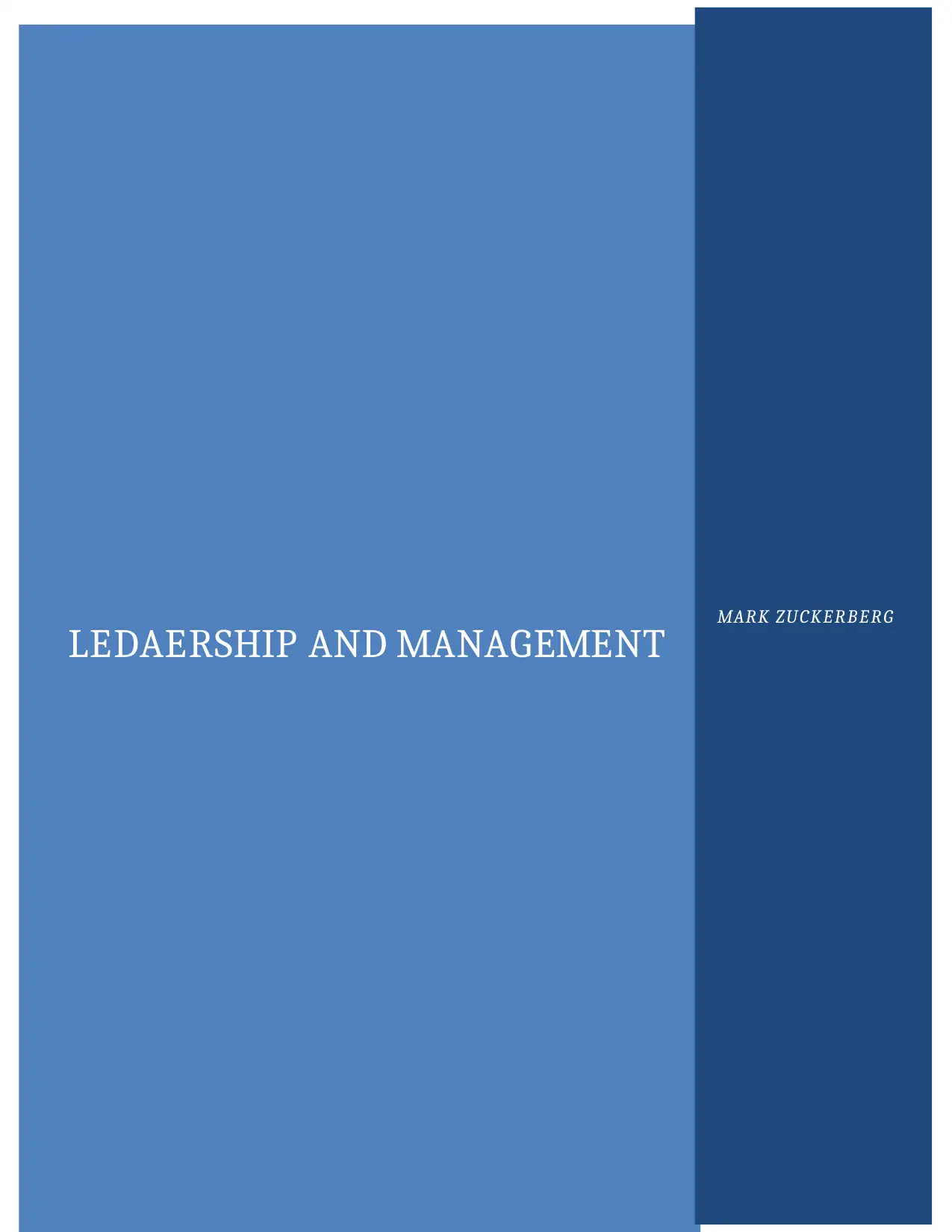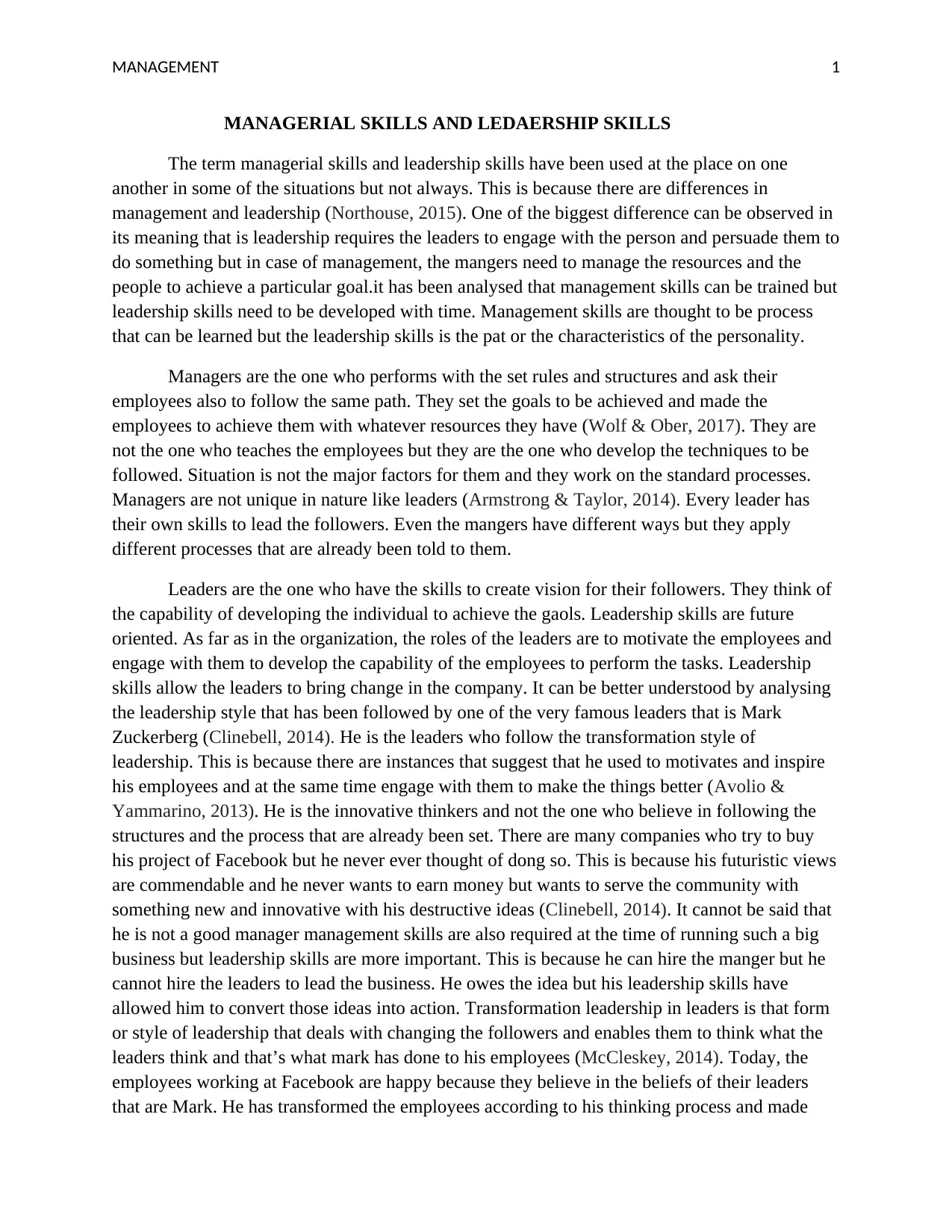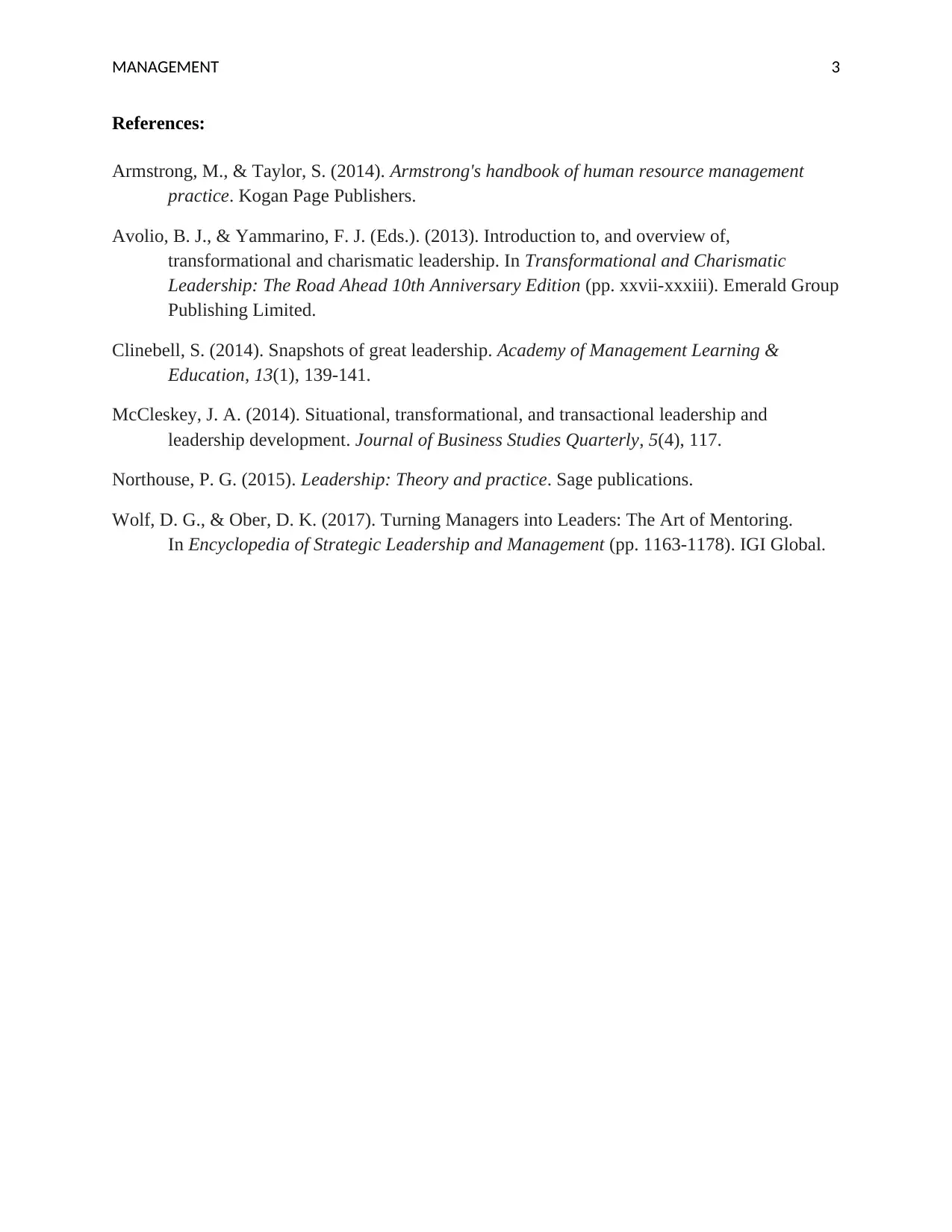Comparing Leadership and Management Skills: A Study on Mark Zuckerberg
VerifiedAdded on 2020/04/01
|4
|898
|96
Essay
AI Summary
The essay delves into the differences between leadership and management skills, emphasizing that while management can be trained through processes, leadership is an inherent trait that evolves over time. It contrasts managers who adhere to set rules and structures with leaders like Mark Zuckerberg, who inspire and engage employees towards innovative goals. The discussion highlights Zuckerberg's transformational leadership style at Facebook, where he motivates his team to embrace change and think innovatively, showcasing the importance of visionary leadership in fostering organizational growth and community service.

Running head: MANAGEMENT 0
LEDAERSHIP AND MANAGEMENT MARK ZUCKERBERG
LEDAERSHIP AND MANAGEMENT MARK ZUCKERBERG
Paraphrase This Document
Need a fresh take? Get an instant paraphrase of this document with our AI Paraphraser

MANAGEMENT 1
MANAGERIAL SKILLS AND LEDAERSHIP SKILLS
The term managerial skills and leadership skills have been used at the place on one
another in some of the situations but not always. This is because there are differences in
management and leadership (Northouse, 2015). One of the biggest difference can be observed in
its meaning that is leadership requires the leaders to engage with the person and persuade them to
do something but in case of management, the mangers need to manage the resources and the
people to achieve a particular goal.it has been analysed that management skills can be trained but
leadership skills need to be developed with time. Management skills are thought to be process
that can be learned but the leadership skills is the pat or the characteristics of the personality.
Managers are the one who performs with the set rules and structures and ask their
employees also to follow the same path. They set the goals to be achieved and made the
employees to achieve them with whatever resources they have (Wolf & Ober, 2017). They are
not the one who teaches the employees but they are the one who develop the techniques to be
followed. Situation is not the major factors for them and they work on the standard processes.
Managers are not unique in nature like leaders (Armstrong & Taylor, 2014). Every leader has
their own skills to lead the followers. Even the mangers have different ways but they apply
different processes that are already been told to them.
Leaders are the one who have the skills to create vision for their followers. They think of
the capability of developing the individual to achieve the gaols. Leadership skills are future
oriented. As far as in the organization, the roles of the leaders are to motivate the employees and
engage with them to develop the capability of the employees to perform the tasks. Leadership
skills allow the leaders to bring change in the company. It can be better understood by analysing
the leadership style that has been followed by one of the very famous leaders that is Mark
Zuckerberg (Clinebell, 2014). He is the leaders who follow the transformation style of
leadership. This is because there are instances that suggest that he used to motivates and inspire
his employees and at the same time engage with them to make the things better (Avolio &
Yammarino, 2013). He is the innovative thinkers and not the one who believe in following the
structures and the process that are already been set. There are many companies who try to buy
his project of Facebook but he never ever thought of dong so. This is because his futuristic views
are commendable and he never wants to earn money but wants to serve the community with
something new and innovative with his destructive ideas (Clinebell, 2014). It cannot be said that
he is not a good manager management skills are also required at the time of running such a big
business but leadership skills are more important. This is because he can hire the manger but he
cannot hire the leaders to lead the business. He owes the idea but his leadership skills have
allowed him to convert those ideas into action. Transformation leadership in leaders is that form
or style of leadership that deals with changing the followers and enables them to think what the
leaders think and that’s what mark has done to his employees (McCleskey, 2014). Today, the
employees working at Facebook are happy because they believe in the beliefs of their leaders
that are Mark. He has transformed the employees according to his thinking process and made
MANAGERIAL SKILLS AND LEDAERSHIP SKILLS
The term managerial skills and leadership skills have been used at the place on one
another in some of the situations but not always. This is because there are differences in
management and leadership (Northouse, 2015). One of the biggest difference can be observed in
its meaning that is leadership requires the leaders to engage with the person and persuade them to
do something but in case of management, the mangers need to manage the resources and the
people to achieve a particular goal.it has been analysed that management skills can be trained but
leadership skills need to be developed with time. Management skills are thought to be process
that can be learned but the leadership skills is the pat or the characteristics of the personality.
Managers are the one who performs with the set rules and structures and ask their
employees also to follow the same path. They set the goals to be achieved and made the
employees to achieve them with whatever resources they have (Wolf & Ober, 2017). They are
not the one who teaches the employees but they are the one who develop the techniques to be
followed. Situation is not the major factors for them and they work on the standard processes.
Managers are not unique in nature like leaders (Armstrong & Taylor, 2014). Every leader has
their own skills to lead the followers. Even the mangers have different ways but they apply
different processes that are already been told to them.
Leaders are the one who have the skills to create vision for their followers. They think of
the capability of developing the individual to achieve the gaols. Leadership skills are future
oriented. As far as in the organization, the roles of the leaders are to motivate the employees and
engage with them to develop the capability of the employees to perform the tasks. Leadership
skills allow the leaders to bring change in the company. It can be better understood by analysing
the leadership style that has been followed by one of the very famous leaders that is Mark
Zuckerberg (Clinebell, 2014). He is the leaders who follow the transformation style of
leadership. This is because there are instances that suggest that he used to motivates and inspire
his employees and at the same time engage with them to make the things better (Avolio &
Yammarino, 2013). He is the innovative thinkers and not the one who believe in following the
structures and the process that are already been set. There are many companies who try to buy
his project of Facebook but he never ever thought of dong so. This is because his futuristic views
are commendable and he never wants to earn money but wants to serve the community with
something new and innovative with his destructive ideas (Clinebell, 2014). It cannot be said that
he is not a good manager management skills are also required at the time of running such a big
business but leadership skills are more important. This is because he can hire the manger but he
cannot hire the leaders to lead the business. He owes the idea but his leadership skills have
allowed him to convert those ideas into action. Transformation leadership in leaders is that form
or style of leadership that deals with changing the followers and enables them to think what the
leaders think and that’s what mark has done to his employees (McCleskey, 2014). Today, the
employees working at Facebook are happy because they believe in the beliefs of their leaders
that are Mark. He has transformed the employees according to his thinking process and made

MANAGEMENT 2
them think what he thinks. His futuristic view suggests that he is the leader with great leadership
skills.
them think what he thinks. His futuristic view suggests that he is the leader with great leadership
skills.
⊘ This is a preview!⊘
Do you want full access?
Subscribe today to unlock all pages.

Trusted by 1+ million students worldwide

MANAGEMENT 3
References:
Armstrong, M., & Taylor, S. (2014). Armstrong's handbook of human resource management
practice. Kogan Page Publishers.
Avolio, B. J., & Yammarino, F. J. (Eds.). (2013). Introduction to, and overview of,
transformational and charismatic leadership. In Transformational and Charismatic
Leadership: The Road Ahead 10th Anniversary Edition (pp. xxvii-xxxiii). Emerald Group
Publishing Limited.
Clinebell, S. (2014). Snapshots of great leadership. Academy of Management Learning &
Education, 13(1), 139-141.
McCleskey, J. A. (2014). Situational, transformational, and transactional leadership and
leadership development. Journal of Business Studies Quarterly, 5(4), 117.
Northouse, P. G. (2015). Leadership: Theory and practice. Sage publications.
Wolf, D. G., & Ober, D. K. (2017). Turning Managers into Leaders: The Art of Mentoring.
In Encyclopedia of Strategic Leadership and Management (pp. 1163-1178). IGI Global.
References:
Armstrong, M., & Taylor, S. (2014). Armstrong's handbook of human resource management
practice. Kogan Page Publishers.
Avolio, B. J., & Yammarino, F. J. (Eds.). (2013). Introduction to, and overview of,
transformational and charismatic leadership. In Transformational and Charismatic
Leadership: The Road Ahead 10th Anniversary Edition (pp. xxvii-xxxiii). Emerald Group
Publishing Limited.
Clinebell, S. (2014). Snapshots of great leadership. Academy of Management Learning &
Education, 13(1), 139-141.
McCleskey, J. A. (2014). Situational, transformational, and transactional leadership and
leadership development. Journal of Business Studies Quarterly, 5(4), 117.
Northouse, P. G. (2015). Leadership: Theory and practice. Sage publications.
Wolf, D. G., & Ober, D. K. (2017). Turning Managers into Leaders: The Art of Mentoring.
In Encyclopedia of Strategic Leadership and Management (pp. 1163-1178). IGI Global.
1 out of 4
Related Documents
Your All-in-One AI-Powered Toolkit for Academic Success.
+13062052269
info@desklib.com
Available 24*7 on WhatsApp / Email
![[object Object]](/_next/static/media/star-bottom.7253800d.svg)
Unlock your academic potential
Copyright © 2020–2025 A2Z Services. All Rights Reserved. Developed and managed by ZUCOL.




